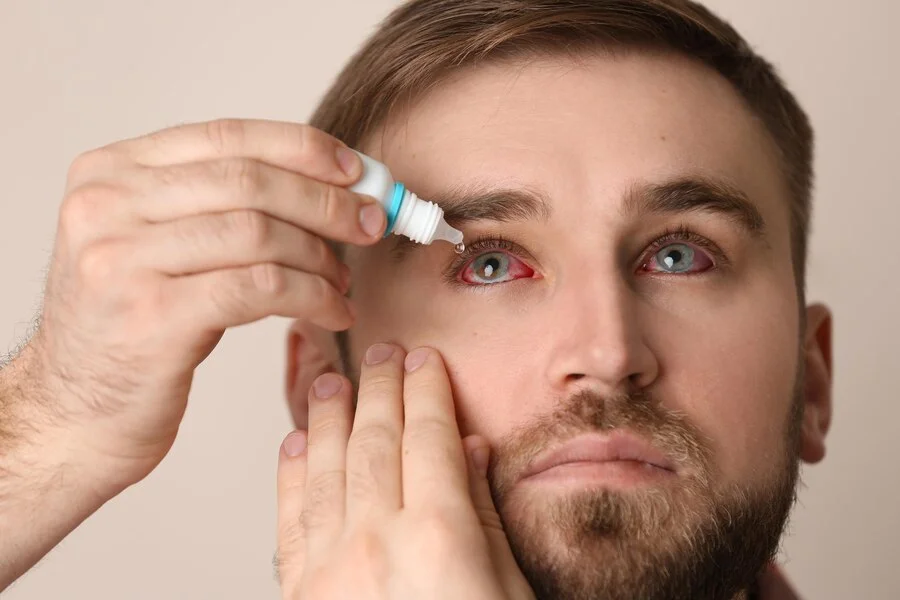Our eyes are windows to the world, constantly taking in sights and beauty. But what happens when the world outside isn't so beautiful? Air pollution, a growing concern in many areas, can wreak havoc on our precious vision. But don't despair! Just like we take steps to protect our lungs from harmful pollutants, there are effective ways to safeguard our eyes.

In this blog, we'll explore 6 key strategies to keep your eyes healthy and comfortable even when air quality dips. From shielding your eyes with protective eyewear to simple lifestyle changes, we'll equip you with the knowledge to fight against air pollution and keep your vision clear.
How to protect your eyes from air pollution
Wear Eyeglasses
If you’re looking to protect your eyes from air pollution, then protecting them with the top eyeglasses can be the best option. Eyeglasses will help you to keep the dust and other elements present in the air away from your eyes. Sunglasses also help our eyes to keep UV rays away from the harsh light.
If you’re looking for the best sunglasses nearby then you can visit Elite Eye Care, New York.
Avoid rubbing eyes
When the eyes come in contact with natural elements, feeling irritation in the eyes is common. But rubbing your eyes isn’t the solution. Continued rubbing may also result in redness in the eyes, and other eye risk factors, instead, you can use the eye drops suggested by your eye doctor.
Use Prescribed Eye Drops
Maintaining proper moisture levels in the eyes is crucial for preventing dryness and protecting against contaminants. Because eye drops are an excellent source of retaining moisture in your eyes. Consistent lubrication helps to relax the eye muscles and reduces pollutant-induced eye discomfort.
Use cold compresses and stay hydrated
Extended exposure to pollutants can induce irritation, although cold compresses can provide relief. Placing a cooled cloth or ice cubes in a soft fabric alleviates irritation and swelling, providing relief to tired eyes. Keeping your eyes moist is vital, but it can also have a significant influence on your entire body. Drinking enough water helps to wash toxins out of the body, improving general eye health.
Reduce direct exposure to pollutants
Taking preemptive actions to prevent direct exposure to pollutants can greatly lower the incidence of allergies and pollutant-induced eye discomfort. On days with high pollution levels, try to stay indoors if possible. In addition, maintain good hand hygiene to reduce the transfer of contaminants to your eyes and surrounding areas.


Addressing Common Eye Problems Caused by Air Pollution
Smog and other airborne contaminants exacerbate a variety of eye problems, such as:
- Burning: discomfort due to pollution exposure.
- Redness: inflammation caused by pollutants.
- Swelling: response to environmental irritants.
- Soreness: discomfort from polluted air exposure.
- Watery: eyes react to airborne pollutants.
- Tired: eyes strain due to pollution.
- Itching: sensation triggered by pollutants.
- Allergies: eye reactions to environmental factors.
- Dryness: caused by pollution's drying effect.
Additional Tips for Minimizing Eye Risk
Healthy Diet and Hydration:
To
keep
your eyes healthy, eat a balanced diet that includes leafy greens, almonds, berries, and
fish. Also, stay hydrated. These options provide vital minerals and Omega-3 fatty acids,
which promote eye health and detoxification.
Consider Alternatives to Contact
Lenses:
If the pollutant is causing discomfort or irritation in your eyes,
you should consider temporarily ceasing the use of contact lenses. Consult an eye care
professional, such as Elite
Eye Care, for correct advice and treatment.
Remove Eye Makeup Before Bed:
To
avoid the negative effects of cosmetic products on your eyes, make sure to completely
remove your eye makeup before going to bed. Use mild makeup removers, particularly.
Orthokeratology (Ortho-K):
This
approach involves wearing special contact lenses at night that reshape the cornea,
temporarily correcting nearsightedness during the day.
Conclusion
Protecting your eyes from the harmful effects of air pollution is critical in today's world. With the abundance of pollutants causing discomfort, dryness, and other problems, it is critical to implement precautionary measures.
Implementing the proposed "5 ways to protect your eyes from air pollution" can reduce risks. Understanding common eye diseases caused by pollution, as well as following other advice such as eating a healthy diet, researching alternatives to contact lenses, and removing eye makeup before bed, can all help to improve eye health.
